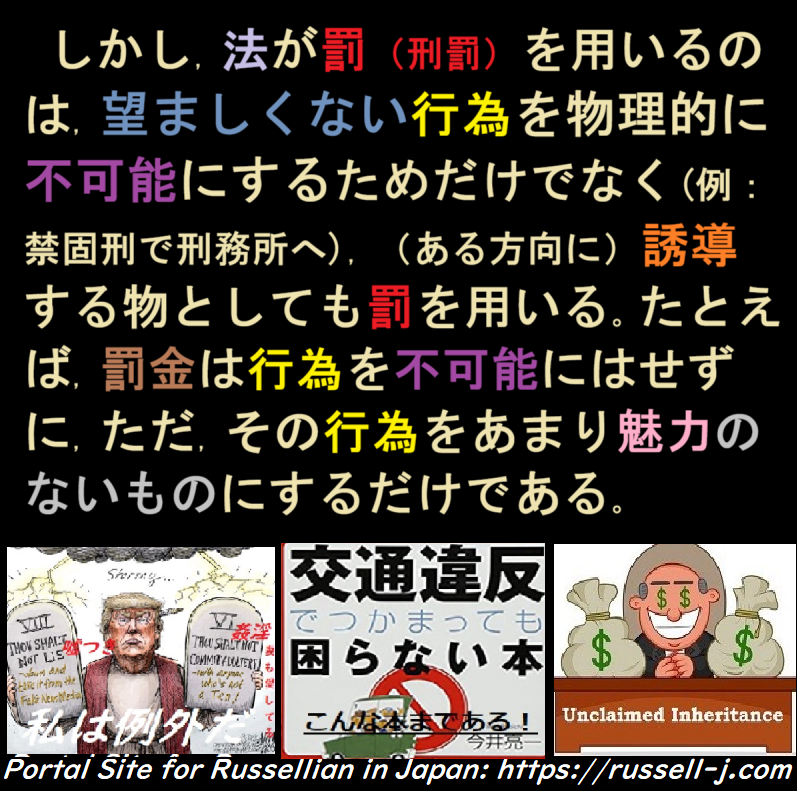
しかし,法が罰(刑罰)を用いるのは,望ましくない行為を物理的に不可能にするためだけでなく,(ある方向に)誘導する物としても罰を用いる。たとえば,罰金は行為を不可能にはせずに,ただ,その行為をあまり魅力のないものにするだけである。
But the Law uses punishment, not only for the purpose of making undesired actions physically impossible, but also as an inducement; a fine, for example, does not make an action impossible, but only unattractive.
Source: Power, a new social analysis, 1938, by Bertrand Russell
More info.: https://russell-j.com/beginner/POWER03_030.HTM
<寸言>
「法の下の平等」という言葉がありますが、これは理念的には何を意味し、現実にはどのように機能しているのでしょうか? この言葉は、多くの場合、「すべての人が法律に対して対等な立場にあり、身分や地位、財産によって差別されない」という原則を示すものと理解されています。
たとえば、権威主義体制の下では、権力者の恣意的な判断による「人の下での支配」が行われるのに対し、民主主義国家では「法の下での支配」が原則とされ、すべての国民が法律によって平等に扱われるべきだとされます。
しかし、ここで疑問が生じます。
「形式的に同じ法律を適用すること」が、果たして「実質的な平等」につながっているのでしょうか?
たとえば、ある違反行為に対して一律に「罰1万円」が科せられるとします。見かけ上は平等に見えますが、この1万円は、生活保護を受けている人にとっては生活を揺るがすような負担です。一方、年収1億円の富裕層にとっては、チップ程度のものであり、何度違反を繰り返しても気にしないかも知れません。
形式的には平等でも、実質的にはその適用が富裕層を優遇する結果になっているとすれば、「法の下の平等」は果たして機能していると言えるのでしょうか? こうした状況は、多くの人々にとって不公平感を生み、不満の原因となり得ます。
では、「法の下の平等」とは、本来どのように定義されるべきなのでしょうか?
単に「形式的に同じルールをすべての人に適用すること」でよいのか、それとも「そのルールが人々に与える実質的な影響」まで考慮すべきでしょうか?
この問いは、「法における平等」は単なる形式的平等を意味するのか、あるいは実質的平等をも含意すべきなのかという、極めて重要な問題を提起しています。
あなたはどう考えるでしょうか? トランプ大統領なら「形式的に同じ法律を適用すること」を正しいと考えるでしょう。いや、権力者はそれよりももっと優遇されるべきだと主張するかも知れません。
There is a phrase often used: "equality under the law." But what does it mean in principle, and how does it actually function in practice?
The phrase is commonly understood to express the principle that all individuals stand on equal footing before the law and should not be discriminated against on the basis of social status, rank, or wealth.
In authoritarian regimes, rule is often exercised through the arbitrary will of those in power -- that is, rule by persons. In contrast, in democratic states, the basic principle is rule under law, and all citizens are expected to be treated equally under that law.
Yet this raises an important question:
Does "applying the same law uniformly to everyone" truly lead to substantive equality?
Consider a case in which a violation of the law results in a uniform fine of 10,000 yen. On the surface, this appears equal. However, for someone receiving welfare, 10,000 yen could represent a serious financial blow. For someone earning 100 million yen a year, it may feel like nothing more than a small tip -- and they might not hesitate to repeat the offense, paying the fine each time without concern.
If such a law, though formally equal, in effect favors the wealthy, can we truly say that "equality under the law" is functioning properly? This situation could easily generate a sense of unfairness and dissatisfaction among many citizens.
So how should "equality under the law" be defined?
Is it sufficient to apply the same rules to everyone, or should we also consider the actual impact those rules have on people in different circumstances?
This question points to a fundamental issue:
Does legal equality refer only to formal equality, or should it also encompass substantive equality?
What do you think?
President Trump would likely argue that applying the same law equally to all is the right approach. Or perhaps he might even claim that those in power deserve special treatment beyond that.